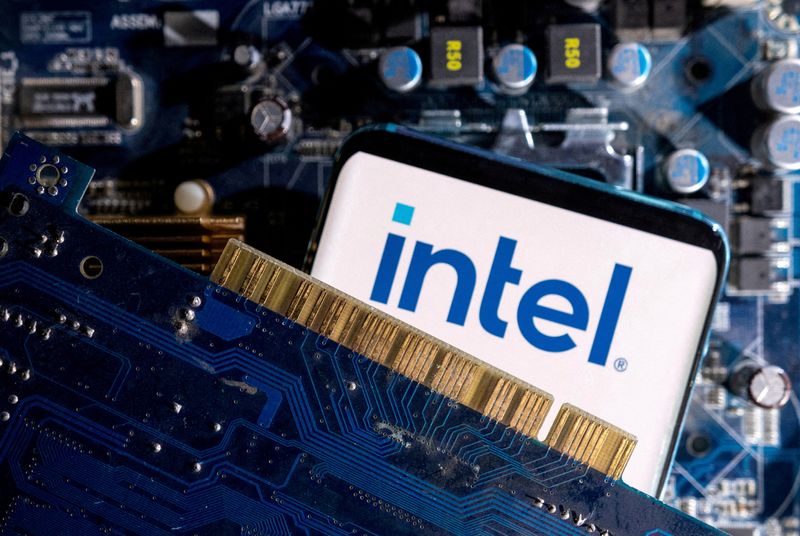By Friederike Heine, Supantha Mukherjee and Andreas Rinke
BERLIN/STOCKHOLM (Reuters) -Intel will spend more than 30 billion euros ($33 billion) to develop two chip-making plants in Magdeburg as part of its expansion push in Europe, a deal Chancellor Olaf Scholz hailed on Monday as Germany's biggest ever foreign investment.
Berlin has agreed subsidies worth nearly 10 billion euros with the U.S. chipmaker, a person familiar with the matter said, more than the 6.8 billion euros it had initially offered Intel (NASDAQ:INTC) to build two leading-edge facilities in the eastern city.
Intel CEO Pat Gelsinger said he was grateful to the government and the state of Saxony-Anhalt, where Magdeburg is located, for "fulfilling the vision of a vibrant, sustainable, leading-edge semiconductor industry in Germany and the EU".
Under Gelsinger, Intel has been investing billions in building factories across three continents to restore its dominance in chipmaking and better compete with rivals AMD, Nvidia (NASDAQ:NVDA) and Samsung (KS:005930).
"Today's agreement is an important step for Germany as a high-tech production location – and for our resilience," Scholz said after Monday's signing.
"With this investment, we are catching up technologically with the world's best and expanding our own capacities for the ecosystem development and production of microchips."
The German deal marks Intel's third big investment in four days. It unveiled plans on Friday for a $4.6 billion chip plant in Poland, another European Union member, while Israel said on Sunday that Intel would spend $25 billion on a factory there.
Globally, semiconductor manufacturing is expected to become a trillion-dollar industry by 2030, expanding from $600 billion in 2021, according to McKinsey.
Both the United States and Europe are trying to lure big industrial players via a mix of state subsidies and favourable legislation, with Germany concerned about losing appeal as a place to invest.
The government in Berlin is investing billions of euros in subsidies to lure tech companies, amid growing alarm over supply chain fragility and dependence on South Korea and Taiwan for chips.
ATTRACTIVE LOCATION
"The size of Intel's reaffirmed and increased commitment to its expansion in Magdeburg speaks louder than words about Germany's appeal as a high-tech business location," said Robert Hermann, CEO of government agency Germany Trade & Invest.
Berlin is also talking with Taiwan's TSMC and Sweden's electric vehicle battery maker Northvolt about setting up production in Germany, having already convinced Tesla (NASDAQ:TSLA) to build its first European gigafactory there.
Frankfurt-listed Intel shares were 0.3% higher at 1534 GMT.
Monday's agreement includes what Intel said was increased government support, including incentives, reflecting the expanded scope of the project since it was first announced in March 2022.
Initially, Intel wanted to invest 17 billion euros in the Magdeburg plant, an amount that has nearly doubled to more than 30 billion.
"This shows: Germany is a highly attractive location. We play at the forefront of global competition and secure sustainable and qualified jobs and value creation," Economy Minister Robert Habeck said.
The first facility in Magdeburg is expected to enter operation 4-5 years after the European Commission's approval of the subsidy package, Intel said.
About 7,000 construction jobs will be created in the first expansion, plus around 3,000 high-tech jobs at Intel and tens of thousands of jobs across industry, the U.S. chipmaker said.
Intel announced plans last year to build a big chip complex in Germany and facilities in Ireland and France as it seeks to benefit from easier European Commission funding rules and subsidies. The EU is trying to reduce its dependence on U.S. and Asian chips supply.
Gelsinger had told Reuters on Friday that the gap between what Germany had offered in subsidies and what Intel needed was too big but said he expected to reach an agreement, adding that his request was to be cost competitive.

"We lost this industry to Asia, we have to be competitive if we're going to bring it back," he said.
($1 = 0.9150 euros)